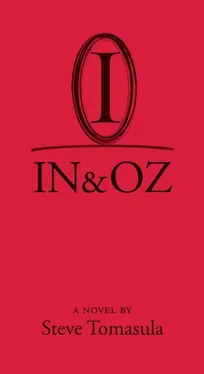So he concluded one day, trying to square his inner being with the loss of his outer business, If Thomas Alva Edison was a mechanic, he didn’t want to be a mechanic. If Archimedes was a mechanic, he didn’t want to be a mechanic. If Da Vinci was a mechanic, he thought, he’d give it a chance. But he didn’t need “customers” to do so — not if, as Photographer claimed, it was looking that made the photographer, or dancing the dancer.
Without giving it any more thought, he got up one morning, put on his mechanic’s boots, and his mechanic’s uniform, but instead of opening his shop, he walked past the empty dog pen, walked past the oil stains in the empty driveway where customers once lined up with their foul plugs, and blown gaskets. He got behind his own car and pushed it out onto the road, signaled for a U-turn, then began the long, arduous climb up the grade that became the bridge he lived beneath where up-above he took a job as a tollbooth attendant.
If he could no longer repair cars, truly repair them and not just make offending parts invisible, then he could at least appreciate them, and do his own work, the work no one would pay him to do, on his own time, as poets and philosophers have always done. Rather than participate in what had become for him unbearable, he would stand in a tiny booth at the middle of the bridge that connected the flatland of IN with the floating world of OZ, midway between earth and sky, collecting tolls from the passing motorists while the planets aligned, and perhaps, the one audience who mattered the most came out to meet him halfway. And so he did, seeing her hand in every sensuous fender, every perky headlamp and all the quarter panels, door trim and the rest that ebbed, then flowed through his lane.
In IN, Desire was as simple as stripes on a bar code, Fulfillment as baroque as a loan.
“Composers who insist upon working within the audio spectrum,” Composer said, “would do well to study that most perfect of concert instruments, the slide whistle.” He, Mechanic, and Designer, but not Photographer, Photographer having refused to come along, were in one of the many industrial taverns of IN, smoking standard cigarettes, and drinking standard alcohol that tasted to Mechanic like antifreeze. He himself would have never chosen this tavern, which only went by the name DRINK BOOZE. Especially not as a place to meet such a non-standard woman as Designer. But the dirtier the bar, the more directly its income was tied to the factory payroll, the more Composer and Photographer seemed to like it. He had always dismissed this aspect of their taste as just another of the many things he didn’t understand about them. But it became especially baffling when he learned that Composer and Photographer had both been born in OZ and educated in OZ and still had the money to live in OZ, their families made up of wealthy OZ professors and business people, even doctors and judges — a fact he should have realized from the first time they shook hands, their hands being as soft as the foam rubber of luxury-car seats. Unlike his own standard mechanic’s hands. Or the hands of his mechanic father. Or the hands of his mother who had to carry heavy pots of cabbage every day of her life. Or, come to think of it, the hands of everyone he had ever known growing up in IN. This legacy of hands was why he, but neither of them, was concerned about finding actual work. That is, the kind of work that was dull and/or dirty and/or dangerous and/or demeaning and so no one wanted to do and would therefore pay to have done for them, unlike making music or art — what they also called their “work.” But it didn’t explain why they had chosen to live in IN, while he, if he had ever thought of it which he never did, it being such an impossible thing to think, would have liked to live in OZ.
“Listening to the slide whistle,” Composer was saying, “we understand how illusory are the borders of any single ‘note.’ We understand how it is only through an appeal to the most artificial of conventions, the musical score, the constraints of hearing, that the composer of the audio spectrum makes us come to believe in this sleight-of-hand called music.” He paused to take a slow drag on his cigarette, letting the smoke whistle out. “A-sharp or B-flat?”
Mechanic couldn’t help but notice how Designer hung on his words. Dressed down in a faux work shirt tailored to show off her figure, her hair was pulled back under a matching stoker’s cap. It accentuated the clean design of her face — square chin and a model’s cheekbones. Stealing glances at her foreign-import proportions, he could distinguish through her dungarees the outline of leggy legs, as sleek and elegant as her own designs. One leg dangling over the other, they ended in shoes designed to resemble work boots only not so much that it wouldn’t be obvious that she didn’t actually “work” (in the way the word was used in IN); her faux work boots were too petite to contain the steel reinforcing that real boots needed to protect toes from being crushed by a dropped beam. Even if her work shirt had had her name stitched over its pocket like a real work shirt instead of the “Grrrr-l” that was actually embroidered there, even if she wore greasy coveralls, the bar patrons gawking at her could have told she wasn’t from IN, Mechanic knew, Mechanic being one of them.
He considered his own pinstriped mechanic’s coveralls. Then he considered the pipe-fitter’s jacket and turtleneck Composer wore. Though they both bought their clothes at the same resale and vintage boutiques of gas-station attendant uniforms and high-voltage-proof hip-waders, the work shirts that Mechanic wore looked like work shirts, while Composer’s work shirts somehow came off as fashion. Why? Mechanic wondered, looking from the lifetime of premium, not standard, health benefits written in the luster of Designer’s blonde hair, to the straightness and whiteness of Composer’s teeth, to both of their creamy-smooth skins: skin that looked perpetually new unlike repainted hoods and fenders that always showed a trace, especially when the light was right, of earlier crumples that could never be hammered out completely.
“Aesthetic decisions have real-world consequences,” Composer said, speaking up to be heard over the argument growing around one of the standard coin-operated pool tables found in all the bars of IN. “By preventing audiences from slipping into the passive, dreamlike trance of listening, by forcing them to instead work for every note with their eyes, they apprehend the constructed nature of music. That is, as they follow one of my scores, they see how there is nothing natural about it — or any music. March music, for example. While our passions are being excited by the rhythms of march music, its stirring melodies of fifes, bugles, and drums, we also absorb, usually unconsciously, how natural it is for there to be a military to play it.”
One of the guys playing pool was a sinewy rat of a sheet-metal worker, sheet-metal workers always having massive forearms from scissoring their shears through tin all day but not the biceps that come from heavy lifting. His partner, the big guy, was a jackhammer operator with a paunch like all jackhammer operators developed to help absorb recoil. It flattened against the pool table when he leaned in to take a shot. The two of them were playing Dunk-a-Drunk 8-Ball, so whoever lost had to chug a shot of standard whiskey. The jackhammer operator was losing. And the more he lost, the drunker he got, the more he lost, the drunker he got, the more he lost & Etc. Every time he threw back another drink, his wiry opponent took the opportunity to chalk a fingertip with one of the blue cubes meant for the cues. Then he would say, “That’s using the noggin,” and stamp a blue dot on the big guy’s ugly forehead.
Читать дальше











